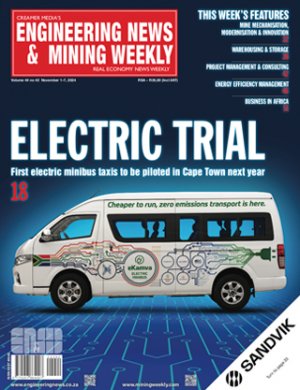Engineering, management and specialist technical services company Aurecon says, water, which is a finite resource and is mostly allocated to users, will become significantly more expensive for South Africans, as companies will have to start using water from the ocean to produce drinking water, which requires high-cost desalination plants.
“There is only one basin in South Africa that has significant surplus water that has not already been earmarked for development, but few people reside in and around that basin,” says Aurecon specialist engineer Andrew Tanner adding that there is, however, an abundance of seawater, which can be transformed into drinking water through the desalination process.
The company highlights that urbanisation is causing not only increasing demand for water in certain areas but also demand that will eventually exceed the limited available water supply.
Aurecon business development manager Enoch Dlamini notes that the deteriorating quality of available water is also concerning. “Poor-quality water requires additional filtration and purification, which are costly.”
“If people were charged the real value of water, we would all conserve it,” says Tanner, who emphasises that water is, in general, significantly underpriced throughout the world.
Further, Aurecon is working on various projects throughout the country that the company says will help raise water awareness.
It has recently completed a trans-boundary study, based at the Limpopo river basin, which spans four countries. The study included a situational assessment and considered various factors affecting the basin’s water resources and water use. “This study has helped to bring member States together,” says Dlamini, who adds that the study has created awareness surrounding the importance of managing water as a shared resource.
Studies, such as the ones conducted in Limpopo, can take anywhere from 18 months to two years to complete, and help people to communicate about water issues. “Communication is key,” notes Tanner, adding that, in all the basins in which Aurecon has been involved in terms of conducting studies, it has identified room for improvement in water management.
Aurecon highlights that it is important to have water-use regulations at regional level, as they will guide the ways in which the resources are managed, and simplify the debates pertaining to its use, says Dlamini.
Communication Challenges
“A significant challenge is instilling awareness of the difference between the amount of available water in nature versus the availability of water in taps,” says Tanner, who adds that the availability and maintenance of water infrastructure plays a crucial role in water management.
Another challenge is the prioritisation of water use. “Some would argue that water belongs to the environment, while others would say that water should be readily available for people who are in the production sector, such as farmers,” says Dlamini.
He adds that Aurecon’s studies attempt to predict the impacts of particular water uses on the environment, people and the economy. Tanner also highlights the importance of community involvement when conducting water studies.
World Water Supply
Some countries with scarce water resources have developed effective water systems, while countries with the most abundant water sources do not deliver adequate water supply to households, owing to inadequate infrastructure.
An example of such a country is South Africa, which is experiencing water shortages in various communities, owing to a lack of maintenance on water infrastructure over the years, rather than a lack of water resources.
Trends in Water
Aurecon states that one of the trends being adopted is the source-to-user approach, which implies that water should be managed and monitored from its initial source to consumption by trained personnel using appropriate infrastructure.
“South Africa could greatly benefit from having a holistic approach to water, which can be implemented with the source-to-user approach,” says Aurecon competency leader Peter Blersch.
He notes that communities are not aware of what is required to produce and deliver potable water. “There is a complex system involved when taking water from its natural origin and purifying, maintaining and finally transferring it to a point of access,” he says.
Aurecon highlights that one of the major challenges is local authorities facing management and maintenance skills. “Many municipalities face significant maintenance challenges in terms of water infrastructure,” says Blersch, adding that the continuity in terms of job-related tasks is required.
“South Africa is possibly one of the world leaders in integrated water resource management,” says Blersch, adding that this approach to water management started in the late 1980s. “Maintaining this will require correct, careful management from municipalities.”
This will include building the skills pipeline to take over from experienced people in the water industry and adopting a holistic approach. “Going forward, we cannot afford to lose these skills and this approach to water management,” he says, adding that Aurecon offers training and bursary programmes to graduates interested in the water industry.
Aurecon notes that another solution to water shortages in rural areas is the use of boreholes. “Boreholes are easy to maintain and provide clean, healthy drinking water when managed properly,” says Blersch, adding that people have misconceptions about the purity of borehole water, since it comes from the ground and is not purified.
Edited by: Megan van Wyngaardt
Creamer Media Contributing Editor Online
EMAIL THIS ARTICLE SAVE THIS ARTICLE
To subscribe email subscriptions@creamermedia.co.za or click here
To advertise email advertising@creamermedia.co.za or click here










